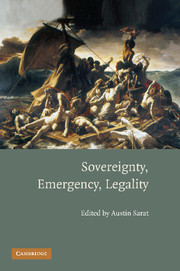Book contents
- Frontmatter
- Contents
- Contributors
- Acknowledgments
- Introduction: Toward New Conceptions of the Relationship of Law and Sovereignty under Conditions of Emergency
- 1 The “Organic Law” of Ex Parte Milligan
- Comment on Chapter 1: David Dyzenhaus, “The ‘Organic Law’ of Ex Parte Milligan”
- 2 Emergency, Legality, Sovereignty: Birmingham, 1963
- Comment on Chapter 2: “Order” in the Court
- 3 The Banality of Emergency: On the Time and Space of “Political Necessity”
- Comment on Chapter 3: Emergencies, Body Parts and Price Gouging
- 4 The Racial Sovereign
- Comment on Chapter 4: Toward a Nonracial Sovereign
- 5 Should Constitutional Democracies Redefine Emergencies and the Legal Regimes Suitable for Them?
- Comment on Chapter 5
- Index
2 - Emergency, Legality, Sovereignty: Birmingham, 1963
Published online by Cambridge University Press: 07 May 2010
- Frontmatter
- Contents
- Contributors
- Acknowledgments
- Introduction: Toward New Conceptions of the Relationship of Law and Sovereignty under Conditions of Emergency
- 1 The “Organic Law” of Ex Parte Milligan
- Comment on Chapter 1: David Dyzenhaus, “The ‘Organic Law’ of Ex Parte Milligan”
- 2 Emergency, Legality, Sovereignty: Birmingham, 1963
- Comment on Chapter 2: “Order” in the Court
- 3 The Banality of Emergency: On the Time and Space of “Political Necessity”
- Comment on Chapter 3: Emergencies, Body Parts and Price Gouging
- 4 The Racial Sovereign
- Comment on Chapter 4: Toward a Nonracial Sovereign
- 5 Should Constitutional Democracies Redefine Emergencies and the Legal Regimes Suitable for Them?
- Comment on Chapter 5
- Index
Summary
Emergency, it is often thought, challenges sovereignty. Usual agendas, distributions of responsibilities – the ordinary patterns of government – are put in question. Extraordinary schemes prompt new assignments of authority, new claims to power. Precisely because these claims mark departures, they unsettle. Ultimate authority, it may be said, rests with whoever seizes the moment, successfully characterizes the right response to emergency, redefines the organization of government, inevitably thereby fixing limits on the reach of previously settled arrangements. Legality, within this account, is secondary: elaborates and reinforces the ordinary regime, or within the state of emergency reboots (we might say), elaborating and reinforcing the new order.
There is also another account. Legality – its working accumulation of instruments, norms, and institutions – constructs sovereignty, establishes authority, throughout the course of its ramifications. Emergencies, like ordinary matters, are occasions for construction, occasions for bringing to bear legal resources, become parts therefore of the overall project, perhaps peripheral but sometimes perhaps central or paradigmatic. Emergency, Legality, Sovereignty.
In Law in Times of Crisis, writing with characteristic verve, Oren Gross and Fionnuala Ni Aolain name this way of thinking “Business as Usual”:
In times of danger and peril, as in normal times of quiet and calm, the laws (and the powers vested in the government) remain the same. Ordinary legal rules and norms continue to be followed strictly and adhered to with no substantive change or modification. This approach offers a unitary vision of the constitutional order. […]
- Type
- Chapter
- Information
- Sovereignty, Emergency, Legality , pp. 72 - 119Publisher: Cambridge University PressPrint publication year: 2010



